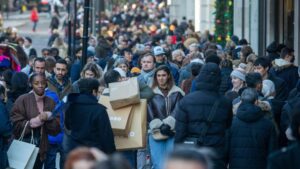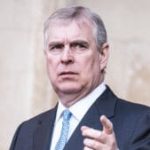
Inflation fell for a third consecutive month in January but remained close to a 40-year high at 10.1 per cent, official figures show.
It is the latest sign that the pace of price rises across the economy is slowing down, but the figures do not offer much respite to households facing a record squeeze in living standards.
The consumer prices index, which is the main measure of inflation, is thought to have peaked at a 41-year high of 11.1 per cent last October, before falling to 10.5 per cent by the end of the year. Economists polled by Reuters had predicted that the index would fall to 10.3 per cent in January.
The main driver of the fall was a continued decline in the price growth of petrol and diesel, as well as flight and coach fares. Together, inflation in the cost of transport fell for a seventh consecutive month to 3.4 per cent, down from a peak of 15.2 per cent last June.
There was also a slight slowdown in price rises at restaurants and cafés. However, the drop was partially offset by price rises in alcohol and tobacco, which were up by 4.6 per cent and 0.8 per cent month-on-month in January.
Underlying inflation, which excludes volatile movements in energy, food, alcohol and tobacco, fell to 5.8 per cent in January, down from 6.3 per cent in December.
The UK is suffering its worst bout of inflation in a generation because of a combination of soaring global energy prices, the war in Ukraine, Covid and Brexit. The Bank of England expects the rate, which is at more than five times its 2 per cent target, to fall to 4 per cent by the end of the year.
The central bank has implemented ten back-to-back interest rate rises since December 2021, when the cost of borrowing was at a historic low of 0.1 per cent, to bring the base rate to its highest level in 15 years at 4 per cent.
James Smith, research director at the Resolution Foundation, said that despite the fall in inflation, the rate remained higher than in many other advanced economies. The United States reported yesterday that its inflation reading for January was 6.4 per cent, down from 6.5 per cent in December.
“The fall in [UK] services inflation, coupled with evidence yesterday that private-sector wage growth is easing, should allay some of the fears in the Bank that persistent inflation has taken hold,” Smith said. “However, with energy and food prices remaining stubbornly high, poorer households continue to face far higher living costs than richer families.”
Falling inflation “may not be enough” to stop the Bank raising interest rates, according to Yael Selfin, a chief economist at KPMG. “Lower energy prices and the downward base effect from last year’s spike in oil and gas prices are expected to see inflation falling sharply this year,” she said. “This could bring inflation back to target early next year.”
The Bank of England is under pressure to change course after its series of interest rate rises, but “continuing strong wage pressures add to the risk that inflation becomes more entrenched and persistent, making the Bank more reluctant to pivot to a new strategy” Selfin added.
Read more:
UK inflation falls for third month in a row to 10.1%






